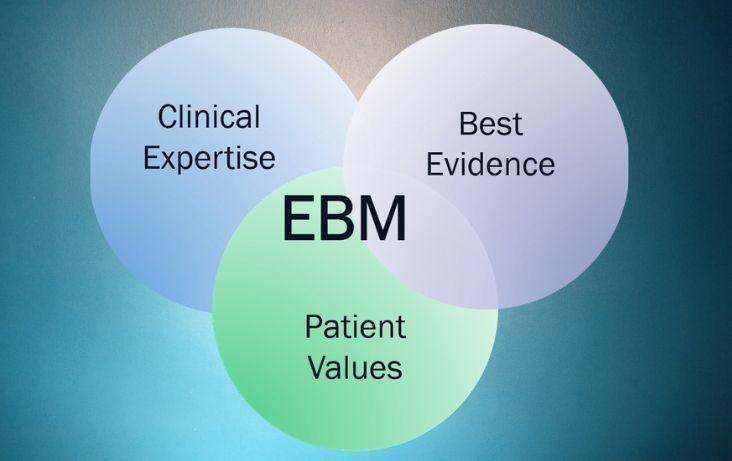Principles of Evidence Based Medicine - A K Akobeng (as summarised by S Carstens)
Curated from: adc.bmj.com
Ideas, facts & insights covering these topics:
9 ideas
·794 reads
4
Explore the World's Best Ideas
Join today and uncover 100+ curated journeys from 50+ topics. Unlock access to our mobile app with extensive features.
So you Want to Know About EBM... (Evidence-Based Medicine)
EBM is the integration of evidence, clinical expertise, and patient values and preferences. Factors influencing clinical expertise include judgement, clinical skills and personal experience. EBM requires life-long self-monitored learning to stay up-to-date with the most recent clinical interventions and techniques, as this information is constantly changing.
12
215 reads
Why use EBM?
EBM aims to improve patient care quality and produce optimal patient outcomes. It is identifying and promoting clinical practices that work, and eliminating those that don't. Additionally, the precision, accuracy and power of the intervention must be critically assessed. This process furthers the development of critical thinking.
13
103 reads
The 5-Step Model
According to AK Akobeng, there are five main steps to properly practise EBM. The next few blocks will explore this concept.
12
97 reads
STEP 1
Formulate Answerable Clinical Questions (CQs)
The key is to translate the clinical problem into an answerable clinical question (CQ) – e.g. “Is treatment A effective in irradicating disease B?”. CQs should be clear, focus directly on the presenting complaint, and be answerable in terms of clinical evidence available.
Form clinical questions using the PICO method.
“P” - the Patient themself and the Problem i.e. their medical history and presenting complaint.
“I” - Intervention i.e. the treatment / test used.
“C” - Comparison of various interventions.
“O” - Outcome i.e. the predicted result.
12
86 reads
STEP 2A
Find the Evidence : Source
Look for evidence that will answer your CQ. Clinical databases (e.g. Archimedes) are relatively reliable and timesaving sources, compared to traditional textbooks and oral sources. The Cochrane Database - a collection of system reviews - is also widely used in the medical field.
13
71 reads
STEP 2B
Find the Evidence : Search
Being able to search these databases is another skill in and of itself. Firstly, extract keywords from your PICO framework e.g. Problem is Thrombosis and Intervention is Aspirin, therefore the search will include the words “Thrombosis Aspirin”. When conducting the search, use the operating word “AND” for search results including all keywords and “OR” for either/some of the keywords.
12
49 reads
STEP 3
Appraise the Evidence
Not all research evidence is made the same – some is high-quality and thorough, some isn’t. It is thus paramount that research evidence is appraised in terms of validity, importance, and applicability. The CASP (Critical Appraisal Skills Programme) tools developed by Oxford Univ. incorporate all of these factors and provide a framework for your appraisal.
12
49 reads
STEP 4
Apply the Evidence
Establish the efficacy, risks, availability, and cost of the proposed treatment/test/intervention, and discuss with the patient before proceeding. This establishes trust between the health care practitioner and the patient - a "therapeutic alliance" as Akobeng says.
12
61 reads
STEP 5
Evaluate Performance
Self-monitoring and -auditing are fundamental in EBM practice. Ask yourself, "Am I following all 5 steps to the best of my ability?". This ensures that you are always providing the best possible patient care, and that favourable patient outcomes are strived for and ultimately, achieved.
12
63 reads
IDEAS CURATED BY
CURATOR'S NOTE
A comprehensive summary of AK Akobeng's article on the Principles of Evidence Based Medicine.
“
Seth Carstens's ideas are part of this journey:
Learn more about personaldevelopment with this collection
How to find purpose and meaning in life
How to cultivate gratitude
Techniques for managing negative thoughts
Related collections
Similar ideas
9 ideas
9 ideas
Principles of evidence based medicine
adc.bmj.com
8 ideas
Principles of evidence based medicine - PubMed
pubmed.ncbi.nlm.nih.gov
Read & Learn
20x Faster
without
deepstash
with
deepstash
with
deepstash
Personalized microlearning
—
100+ Learning Journeys
—
Access to 200,000+ ideas
—
Access to the mobile app
—
Unlimited idea saving
—
—
Unlimited history
—
—
Unlimited listening to ideas
—
—
Downloading & offline access
—
—
Supercharge your mind with one idea per day
Enter your email and spend 1 minute every day to learn something new.
I agree to receive email updates









